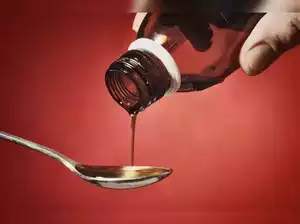For children under the age of four, India has prohibited the use of a common-cold fixed medication combination (FDC). This anti-cold medication cocktail contains two medications: chlorpheniramine maleate and phenylephrine.
While chlorpheniramine maleate is an anti-allergic (antihistamine) medication that relieves allergy symptoms such as runny nose, watery eyes, and sneezing, phenylephrine is a decongestant that narrows the tiny blood vessels, offering relief from nasal congestion or stuffiness.
According to the Indian drug regulator Central Drugs Standard Control Organisation (CDSCO), this drug combination (chlorpheniramine maleate IP 2mg with phenylephrine HCL IP 5 mg per ml drops), which is present in many over-the-counter (OTC) cough syrups and anti-allergic medicines, should have a warning on the label that reads, “FDC should not be used in children below 4 years of age.”
In an interview, According to Dr. Vibhu Kawatra, Consultant Pulmonologist, Pediatrician, and Allergy Specialist, these drugs were formerly prohibited for children under the age of six.
“These drugs should not be sold on the market. Although they used to have a warning about giving it to children less than six years of age, it has now been moved down to four years of age. However, I feel cough syrups or medications with this drug combination of chlorpheniramine maleate and phenylephrine should not be sold as OTC medicines. In fact, they should only be prescribed by a medical professional,” said Dr Kawatra.
Because a child’s immune system is extremely different from an adult’s, drugs with this combination have various adverse effects and can slow your system down, according to the expert. It can cause drowsiness and have an immediate effect on the brain.
Using the examples of dextromethorphan and codeine, which were banned by the Indian government several years ago for containing similar drug combinations, Dr. Kawatra stated that parents have been using and misusing cough syrups just like antibiotics because “they don’t understand the impact these cough syrups can have on a child’s system.”
He added, “There are certain types of medicines like cetirizine and fexofenadine, which are available now. They are specifically not exactly cough syrup. They are anti-allergic syrups. The most common ones are Maxtra, Sinarest or Wikoryl. These are the ones which are commonly given to children. And all of them contain all this combination, including the drops.”
Ascoril Flu, Delcon, and Flucold are among typical drugs that contain the chlorpheniramine maleate + phenylephrine combination.
Dr. Kawatra warns that even cough pills should not be administered to children under the age of two since they can have dangerous negative effects.
In an interview, Dr. Shreya Dubey, Consultant Neonatology and Paediatrics, CK Birla Hospital, Gurugram, said Cough syrups just suppress the irritation while predisposing the infant to additional illnesses.
“Cough medicines can cause sedation, irritability, respiratory depression and behavioural changes in kids. If this combination is given more frequently, more than the recommended dosage, it can have potential side effects that can be harmful to the child’s health,” said Dr Shreya Dubey.
The ban by India’s medicines authority comes after at least 141 children died as a result of cough syrups manufactured in India.
The incidences pushed India to export pharmaceuticals. India, often referred to as the “world’s pharmacy” for its affordable supply of life-saving pharmaceuticals, is now under investigation as a result of these instances.
source:IT







 Finance
Finance







